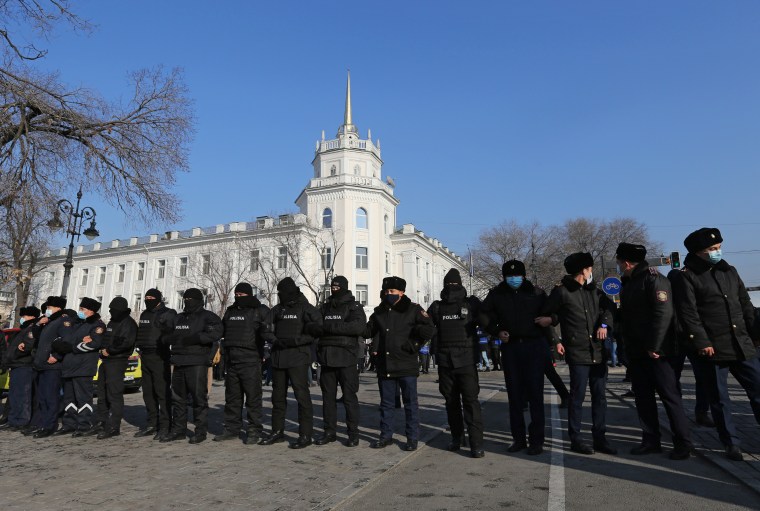On January 10, 2021, Kazakh law enforcement officers and electoral officials harassed and interfered with the work of at least seven journalists who were covering parliamentary elections in the country, according to news reports and journalists who spoke to CPJ.
In Nur-Sultan, the capital, a police officer grabbed the phone of Saniya Toiken, a correspondent with the Kazakh service of the U.S. Congress-funded broadcaster Radio Free Europe/Radio Liberty, while she was filming police detain local activists, according to a report by her employer, posts by the journalist on her personal Facebook page, and Toiken, who spoke with CPJ via messaging app.
The officer deleted some of the videos Toiken had taken and then returned her phone, which had been cracked when the officer confiscated it, according to those sources.
Electoral officials also expelled two RFE/RL correspondents from voting sites for failing to present negative COVID-19 test results: Ayan Kalmurat, expelled from polling location No. 173 in the southern city of Almaty, and Nurtai Lakhanuly, from location No. 893 in the southeastern village of Zhalgamys, according to news reports by RFE/RL and Kalmurat, who spoke with CPJ in a phone interview.
In December, the Kazakh government issued a decree requiring members of electoral commissions, proxies, and electoral observers to provide negative test results at polling sites, but the decree did not extend that requirement to members of the press.
Kalmurat told CPJ that, as he was being expelled, a man who introduced himself as Nurzhan Iskakov, the head of the local election commission, pushed him, twisted his arms, forcefully grabbed his phone, and tried to delete a video from it, but Kalmurat managed to take the phone back.
Later that day, the head of the territorial election commission, Zhanna Asanova, alleged that Kalmurat had introduced himself as an election observer, not a journalist, according to Kalmurat and news reports. Kalmurat disputed that characterization, saying he clearly identified himself as an RFE/RL correspondent, and presented his press card and a written assignment form when he arrived at the station.
Also on January 10, an unidentified election commission representative at voting site No. 446, in the southeastern village of Enbekshi, expelled RFE/RL correspondent Asylkhan Mamashuly while he was covering alleged voting irregularities, according to reports by his employer and by Adil Soz, a local nongovernmental press freedom advocacy organization.
The representative justified the journalist’s expulsion by citing high levels of coronavirus cases in the region, saying the journalist could only be at the polling location for five minutes, according to those reports.
In the central city of Aktobe, the head of polling station No. 28 briefly prohibited RFE/RL journalist Zhanagul Zhursin from filming members of the election commission, but relented after she complained to the official’s superiors, according to those reports by RFE/RL and Adil Soz.
Outside of polling station No. 79, in the southern city of Shymkent, a police officer attempted to confiscate the phone of RFE/RL correspondent Dilara Isa while she was reporting, but failed to do so, according to reports by RFE/RL and Adil Soz, a Facebook post by the journalist, and Isa, who spoke with CPJ via messaging app.
Two law enforcement officers later followed Isa while she was reporting, and when she confronted them, they said that they were providing her “protection,” according to those reports.
In the northern city of Kostanay, the head of polling location No. 1, Bergen Kalakov, alleged that only a “limited number of people” could be allowed inside polling station, and summoned the police to forcibly expel Georgy Govorov, a correspondent of the regional Kazakh newspaper Nasha Gazeta, half an hour before the start of the vote counting, according to Adil Soz, a report by Nasha Gazeta, and Govorov, who spoke with CPJ via messaging app.
The Kazakh government’s December decree relating to coronavirus countermeasures, which CPJ reviewed, pertains to social distancing but does not limit the number of people allowed inside polling stations.
CPJ emailed the Kazakh Central Electoral Commission, the Ministry of Internal Affairs, and Zhanna Asanova of the Almaty election commission for comment, but did not receive any responses. CPJ could not locate contact information for Nurzhan Iskakov or Bergen Kalakov.
